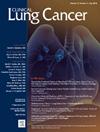挖掘患者生成的健康数据对局部晚期非小细胞肺癌的预后价值
IF 3.3
3区 医学
Q2 ONCOLOGY
引用次数: 0
摘要
患者生成的健康数据(PGHD)包括患者报告的结果(PROs)和可穿戴设备数据,可能对癌症患者有预后价值。我们利用几项前瞻性试验的数据对这一假设进行了检验,这些试验对局部晚期非小细胞肺癌(LA-NSCLC)患者进行了明确的化疗放疗。在一项涉及 PRO-CTCAE 采集的试验(队列 1)中,我们利用 Cox 比例危险模型确定了最能预测无进展生存期(PFS)持续时间的基线患者报告症状。利用包含 EORTC QLQ-C30 问卷和可穿戴设备(队列 2)的试验数据,对同一症状作为无进展生存期预测因子进行了测试。基线体力活动不足也作为预测 PFS 的指标进行了测试。利用 PROs 和体力活动提出了一种简单的风险分层工具。在队列 1(n = 50)中,经过 Bonferroni 校正后,厌食是唯一与 PFS 显著相关的治疗前 PRO(HR = 3.94,= .002)。在队列 2(n = 58)中,基线厌食也与 PFS 显著相关(HR = 2.48,= .018),不运动也与 PFS 显著相关(HR = 3.11,< .001)。队列 2 中厌食或不运动患者的中位生存期为 6 个月,而其他患者的中位生存期为 18 个月(HR = 3.08,< .001)。厌食或不运动患者的中位总生存期为 19 个月,而其他患者为 65 个月(HR = 2.44,= .021)。PGHD(包括PROs和可穿戴设备数据)可为接受确定性化疗的LA-NSCLC患者提供有价值的预后信息。这些研究结果应使用更大的数据集进行验证。本文章由计算机程序翻译,如有差异,请以英文原文为准。
Untapping the Prognostic Value of Patient-Generated Health Data in Locally Advanced Non-small Cell Lung Cancer
Background
Patient-generated health data (PGHD), which includes patient-reported outcomes (PROs) and wearable device data, may have prognostic value for cancer patients. We tested that hypothesis using data from several prospective trials where patients with locally advanced non-small cell lung cancer (LA-NSCLC) were treated with definitive chemoradiotherapy.
Methods
Cox proportional hazards models were utilized to identify the baseline patient-reported symptom that best predicted progression-free survival (PFS) duration in a trial that involved PRO-CTCAE collection (Cohort 1). Using data from trials that included EORTC QLQ-C30 questionnaires and wearable devices (Cohort 2), the same symptom was tested as a predictor of PFS. Baseline physical inactivity was also tested as a predictor of PFS. A simple risk stratification tool utilizing PROs and physical activity was proposed.
Results
In Cohort 1 (n = 50), anorexia was the only pretreatment PRO that was significantly associated with PFS after Bonferroni correction (HR = 3.94, P = .002). In Cohort 2 (n = 58), baseline anorexia was also significantly associated with PFS (HR = 2.48, P = .018), as was physical inactivity (HR = 3.11, P < .001). Median PFS duration for patients in Cohort 2 with anorexia or physical inactivity was 6 months, compared to 18 months for other patients (HR = 3.08, P < .001). Median overall survival duration for patients with anorexia or physical inactivity was 19 months, compared to 65 months for other patients (HR = 2.44, P = .021).
Conclusion
PGHD, including PROs and wearable device data, can provide valuable prognostic information for LA-NSCLC patients treated with definitive chemoradiotherapy. These findings should be validated using larger datasets.
求助全文
通过发布文献求助,成功后即可免费获取论文全文。
去求助
来源期刊

Clinical lung cancer
医学-肿瘤学
CiteScore
7.00
自引率
2.80%
发文量
159
审稿时长
24 days
期刊介绍:
Clinical Lung Cancer is a peer-reviewed bimonthly journal that publishes original articles describing various aspects of clinical and translational research of lung cancer. Clinical Lung Cancer is devoted to articles on detection, diagnosis, prevention, and treatment of lung cancer. The main emphasis is on recent scientific developments in all areas related to lung cancer. Specific areas of interest include clinical research and mechanistic approaches; drug sensitivity and resistance; gene and antisense therapy; pathology, markers, and prognostic indicators; chemoprevention strategies; multimodality therapy; and integration of various approaches.
 求助内容:
求助内容: 应助结果提醒方式:
应助结果提醒方式:


